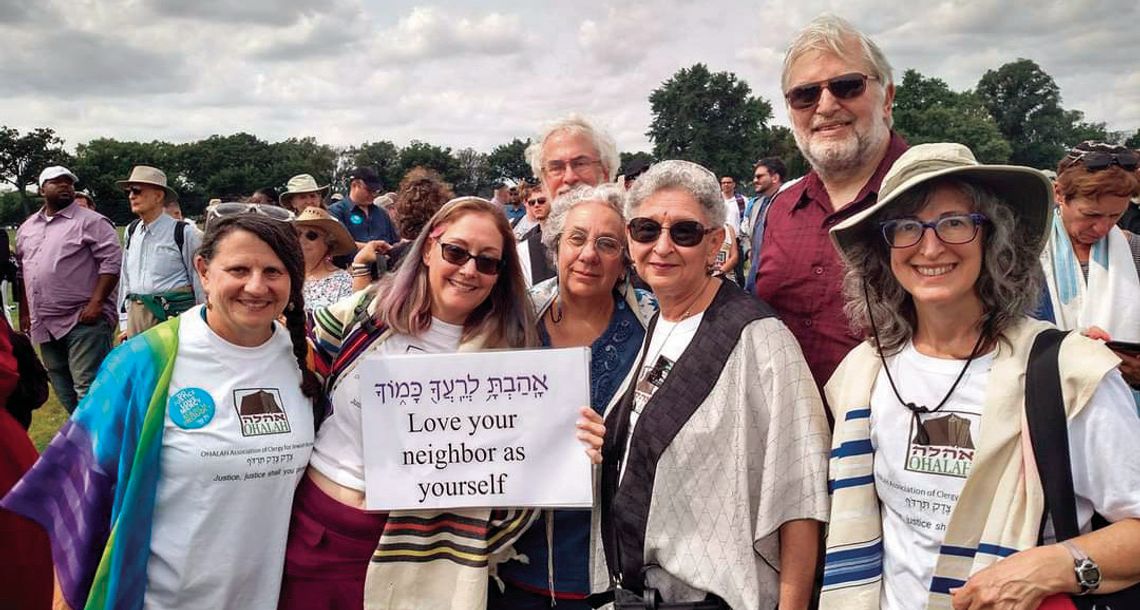When Jesus was asked by his students, “Rabbi, which is the greatest commandment in the Torah?” Jesus replied with a quotation from Devarim (Deuteronomy): “’Love the Lord your God with all your heart, with all your soul, and with all your might.’ This is the first and greatest commandment. And the second is like it: ‘Love your neighbor as yourself.’ All of Torah and the Nevi’im (prophets) hang on these two commandments.” (Matthew 22:36-40) In other words, loving God and loving the stranger are inseparable teachings. Jesus’ answer comes from the very heart of his Judaism.
The commandment to love your neighbor is widely held as the most important ideal in the Jewish religion. The most often repeated commandment in the Torah (the Five Books of Moses or Pentateuch) is to love and help (not wrong) the stranger. 'Commandment' is a poor translation of mitzvot, the term used in the Hebrew Bible and here by Jesus. A better understanding is 'connection.' The Torah speaks to us about connecting with the divine and with the human family through a series of sacred actions called halakha, 'the way to walk' (move through the world), known as Jewish law.
This teaching – to expand our generosity and care to all – is common to Baha'i, Buddhism, Christianity, Hinduism, Islam, Jainism, Judaism, and Sikhism, and other traditions. Today, the teaching to love the outsider is being put to the test. It is challenged by a cultural climate that tells us to do the opposite: fear the stranger, turn the stranger away. Leviticus demands better of us: “The outsider who resides with you shall be to you as one of your citizens; you shall love him as yourself, for you were strangers in the land of Egypt.”
Or Tzafon (Hebrew for Northern Light) is Leelanau County’s only Jewish congregation. For 20 years, we’ve offered retreats, programs, worship, and online learning. Our work is based on what our Jewish Renewal denomination calls “deep ecumenism.” Deep Ecumenism teaches that we can best serve the needs of all humanity when we not only respect other religious paths, but collaborate with them in our shared work of healing creation. (Courtesy of aleph.org) To heal the world, the aim of this new newspaper section, can be done best when we extend a hand in friendship to our neighbors and the strangers among us. This path requires epistemological humility: no one has a corner on the truth. We work best when we work together with loving intent.
Our community – families, faith communities, and folks who don’t belong to a church, sangha, or synagogue – has the possibility of modeling what “love your neighbor” means. We can reach across boundaries to bring the spirit of generosity, love, and kindness to all our neighbors, even the ones who don’t look like us, pray like us, vote like us, or speak like us. As Rabbi Hillel (who died in 10 CE and founded the philosophical school of which Jesus was a disciple) stated simply, “Whatever is hateful and distasteful to you, do not do to your fellow human. This is the entire Torah, the rest is commentary. Go learn.'
In Leelanau Country we can take this “golden rule” one step farther. The platinum rule: treat others the way they wish to be treated. This requires thoughtful interaction, dialogue, and deep listening – all central values in Judaism and the mission of Leelanau’s Or Tzafon.
Rabbi Dr. Chava Bahle is a twice ordained rabbi and maggid - a Jewish inspirational teacher and storyteller. She has lived in Suttons Bay for 24 years. She was the first Jew to earn a doctorate from Catholic Theological Union at Chicago, where her work focused on interreligious dialogue and hospitality to the Other.








